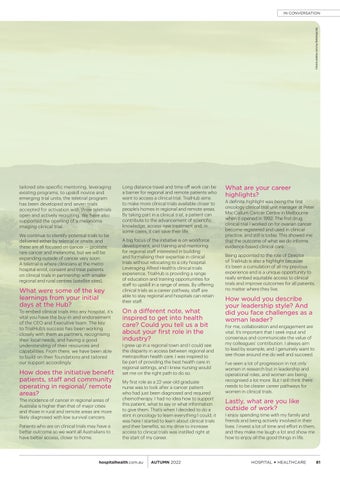©stock.adobe.com/au/leelakajonkij
IN CONVERSATION
tailored site-specific mentoring, leveraging existing programs, to upskill novice and emerging trial units; the teletrial program has been developed and seven trials accepted for activation with three teletrials open and actively recruiting. We have also supported the opening of a melanoma imaging clinical trial. We continue to identify potential trials to be delivered either by teletrial or onsite, and these are all focused on cancer — prostate, rare cancer and melanoma, but we will be expanding outside of cancer very soon. A teletrial is where clinicians at the metro hospital enrol, consent and treat patients on clinical trials in partnership with smaller regional and rural centres (satellite sites).
What were some of the key learnings from your initial days at the Hub?
To embed clinical trials into any hospital, it’s vital you have the buy-in and endorsement of the CEO and Executive team. The key to TrialHub’s success has been working closely with them as partners, recognising their local needs, and having a good understanding of their resources and capabilities. From there, we have been able to build on their foundations and tailored our support accordingly.
How does the initiative benefit patients, staff and community operating in regional/ remote areas? The incidence of cancer in regional areas of Australia is higher than that of major cities and those in rural and remote areas are more likely diagnosed with low survival cancers. Patients who are on clinical trials may have a better outcome so we want all Australians to have better access, closer to home.
Long distance travel and time off work can be a barrier for regional and remote patients who want to access a clinical trial. TrialHub aims to make more clinical trials available closer to people’s homes in regional and remote areas. By taking part in a clinical trial, a patient can contribute to the advancement of scientific knowledge, access new treatment and, in some cases, it can save their life. A big focus of the initiative is on workforce development, and training and mentoring for regional staff interested in building and formalising their expertise in clinical trials without relocating to a city hospital. Leveraging Alfred Health’s clinical trials experience, TrialHub is providing a range of education and training opportunities for staff to upskill in a range of areas. By offering clinical trials as a career pathway, staff are able to stay regional and hospitals can retain their staff.
On a different note, what inspired to get into health care? Could you tell us a bit about your first role in the industry?
I grew up in a regional town and I could see the disparity in access between regional and metropolitan health care. I was inspired to be part of providing the best health care in regional settings, and I knew nursing would set me on the right path to do so. My first role as a 22-year-old graduate nurse was to look after a cancer patient who had just been diagnosed and required chemotherapy. I had no idea how to support this patient, what to say or what information to give them. That’s when I decided to do a stint in oncology to learn everything I could; it was here I started to learn about clinical trials and their benefits, so my drive to increase access to clinical trials was instilled right at the start of my career.
hospitalhealth.com.au
AUTUMN 2022
What are your career highlights?
A definite highlight was being the first oncology clinical trial unit manager at Peter MacCallum Cancer Centre in Melbourne when it opened in 1992. The first drug clinical trial I worked on for ovarian cancer become registered and used in clinical practice, and still is today. This showed me that the outcome of what we do informs evidence-based clinical care. Being appointed to the role of Director of TrialHub is also a highlight because it’s been a cumulation of all my previous experience and is a unique opportunity to really embed equitable access to clinical trials and improve outcomes for all patients, no matter where they live.
How would you describe your leadership style? And did you face challenges as a woman leader?
For me, collaboration and engagement are vital. It’s important that I seek input and consensus and communicate the value of my colleagues’ contribution. I always aim to lead by example, and I genuinely want to see those around me do well and succeed. I’ve seen a lot of progression in not only women in research but in leadership and operational roles, and women are being recognised a lot more. But I still think there needs to be clearer career pathways for women in clinical trials.
Lastly, what are you like outside of work?
I enjoy spending time with my family and friends and being actively involved in their lives. I invest a lot of time and effort in them, and they make me laugh a lot and show me how to enjoy all the good things in life.
HOSPITAL + HEALTHCARE
81
